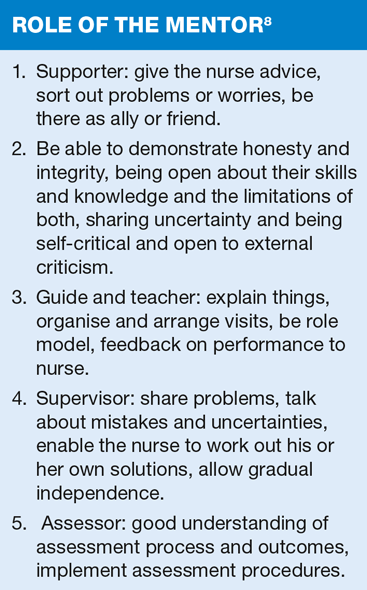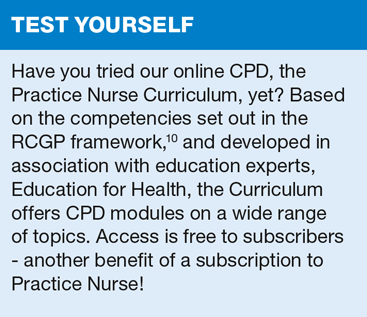Mentorship: at the heart of nursing education
Jenny Greenfield
Jenny Greenfield
BSc (Hons), PG Cert, MSc, FRT
Specilaist practitioner/nurse manager, Independent trainer
Becoming a mentor in general practice nursing can be immensely satisfying but carries great responsibilities – both for the individual you are mentoring and for the future of the primary care workforce
In primary care we have an ageing workforce, with about 30% of practice nurses due to retire in the next 10 years. Although Health Education England (HEE) has mandated Local Education and Training Boards (LETBs) to increase the number of pre-registration nursing students who gain community experience during their training, this will take time to implement. At the moment many students are exposed to general practice for short periods during their training, but this is often only for observation and competences are rarely taught and assessed in the practice setting. The reasons can be largely attributed not only to the lack of funding in practice for pre-registration placements but also to the lack of practice nurses with a mentorship qualification.
Without an understanding of the role of the practice nurse, few nurses will choose general practice nursing as a career option once they qualify. But in some areas, this is beginning to change, and practices are hosting 6-week placements for pre-registration nurses to spend time in the clinic setting. Clinical Commissioning Groups (CCGs) are funding mentorship training for practice nurses, as well as funding primary care for accommodating pre-registration students. This in turn will assist in developing a workforce with wider exposure to a range of health care settings, better equipped to deliver the services envisaged for the future. Universities are incorporating primary care experience in their curricula, enabling competencies to be taught and assessed. To implement all of these initiatives, we need more mentors in general practice nursing.
WHAT IS MENTORSHIP?
The NMC defines a mentor as ‘someone who facilitates learning, supervises and assess students in a practice setting’.1 A study to ascertain what makes effective mentoring concluded that it is a process that produces ‘effective students who, in turn, become competent, confident registrants, who will have mastered the art and craft of caring.’2
The standards for effective mentorship are articulated in the NMC’s Standards to Support Learning and Assessment in Practice (SLAiP), which state that mentors have a responsibility to act as the gatekeepers to the profession. Through positive role modelling and leadership skills, they are expected to provide students with expert teaching, personal support and a robust assessment to ensure that they are fit to practise.1
The NMC has also set out standards for nursing education to ensure that at least 40% is practice focused, thus leading to pre-registration students becoming professionally proficient.3 The practice placement is the best place to build nursing knowledge. It is an important part of nurse education during which students have the opportunity to translate theory into practice, experience the nursing in the ‘real world’, learn about professional values and beliefs, and fulfill statutory requirements for registration within the NMC.4 But to get the most out of a placement, students need mentoring, and in turn, mentors are expected to be able to develop and train their students.
Audits should take place at least annually to ensure that placements meet the conditions of course validation. Occasionally a placement may receive consistently low ratings from students or have a high absence and sickness rate. In these circumstances an audit may be undertaken to diagnose the issues. Audits are typically undertaken by the nurse manager, link tutor and student. An open comprehensive approach to audit enables the transmission of good practice, both educational and clinical, to other placements and has the potential to minimise the gap between theory and practice.2
BECOMING A MENTOR
Becoming a mentor has long been regarded as an important step in a nurse’s career development and in many healthcare organisations is one of the essential criteria for promotion. The support and guidance that mentors provide for student nurses and the assessments they make of students’ progress and competence are at the heart of nursing education.5
The NMC has developed an approved mentor preparation programme. Once completed nurses are qualified to support, teach and assess pre-registration students during practice placement.1
However, there are differing views as to whether all nurses should become mentors or whether it is a separate career pathway. This controversy has arisen mainly over the issues of a mentor’s ability to assess student competence. In the past, mentors focused on guiding student learning while competence was assessed via clinical assessments. Gradually, assessment became part of the mentor’s role, but assessing students’ competence is complex and sometimes challenging. In response to research findings indicating that mentors’ assessments were not always robust,6 the NMC introduced ‘sign-off mentorship’, a system in which experienced mentors with additional training assess whether the final placement students are fit to practise.1 The sign off mentor will be someone who has had substantial clinic experience and the confidence to be able to sign the student off as competent or identify problems which can be managed early in the nursing programme.
Another problem that besets nurses who become mentors, and which makes the role more challenging, is the lack of protected time. It can be difficult to commit fully to the role of mentor within the constant demands of the mentor’s core job. Mentors have identified that work demands have a significant impact on their ability to engage in mentoring activities, such as attending updates and relevant courses, as well as expressing concerns about accountability and supporting failing students. With this is mind, it is essential to remember that the decisions mentors make in assessing students have a direct impact on securing the future of the nursing workforce. It is vital that mentors are able to perform this essential role well, so this involves support from the workplace as well as Continuing Professional Development (CPD).
GPs can often be reluctant to allow their practice nurses to become mentors in case it takes their time away from more immediate nursing tasks such as chronic disease management, or achieving Quality and Outcomes Framework (QOF) targets.
However, mentorship in practice has now been given a boost: the Willis Commission,7 an independent inquiry into pre-registration nurse education, which states that ‘Employers must ensure mentors have dedicated time for mentorship’. This means that mentors will not only have support from universities in training and updating mentors, but also should be well supported and valued with a recognised status within the workplace.
WHY WE NEED MORE MENTORS
Another factor that will impact on the need for more mentors in general practice is the absence of a national funded training programme for practice nurses. Although the NMC has developed standards for general practice nursing (Standards for Specialist Community Nursing Education and Practice – General practice nursing),9 there are a number of funded University schemes around the country that do not appear to be sustainable. So in terms of a pipeline of competent practitioners, general practices find it very difficult to recruit to their workforce. Furthermore, this lack of a national accredited training scheme contributes to inconsistency in the way nurses’ skills are used in general practice.
The RCGP General Practice Foundation10 has developed a framework of competencies for general practice nurses framework, which supports standardised training, and which could be delivered to national educational standards: again, this would involve mentors in the practice workplace.
At present, Health Education England (HEE) is working on a project to develop a national education framework for general practice nurses. This will apply to the whole non-medical workforce, from healthcare assistants (HCAs) to advanced nurse practitioners. The project will develop professional education standards and an education service specification to create a national template, which can be adapted by employers and commissioners for local need.
If there is to be a national accredited education programme, with a nationally agreed competence framework, and delivered to nationally agreed standards for the whole spectrum of nurses working in general practice, with equity of provision across all LETBs, we will need to enlarge our mentorship workforce.
SUCCESSFUL MENTORING
Students rely upon mentors to teach them everything they know, which is of course is impossible. Students will ask questions, watching their mentors’ every move, but also wanting to know about their mentor’s own nursing career. Other nurses, within the student’s placement are also invaluable with regards to education and training. Everyone has their own tried and tested ways of working but these are all performed with protocols in mind. However, some nurses are not willing to mentor students and share their wealth of knowledge. All mentors need to attend annual updates and record CPD evidence against the NMC outcomes. Mentors play a vital role in shaping future nursing professionals and the future of the nursing profession, and with this in mind many mentors gain job satisfaction by being able to carry out this role effectively. To ensure that students receive the high-quality mentoring that they need, mentors must be given support and time in this vital role. They also play a pivotal role in protecting the public by ensuring students are fit for purpose and practice, through planning and supporting learning experiences and robust assessment processes.
CONCLUSION
Mentoring can enhance job satisfaction, both for the student being mentored and for the mentor, and can help nurses to feel that they are valued.
For many years primary care has been striving to provide good quality placements and mentoring for students, but often without any infrastructure to support the time and effort needed to provide mentorship. With the Willis report and HEE, the future looks bright for nurse education and mentorship in primary care. Primary care is hopefully recognised at last as an essential element of nurse education for the future.
REFERENCES
1. NMC. Standards to Support Learning and Assessment in Practice, 2008. http://www.nmc-uk.org/Documents/NMC-Publications/NMC-Standards-to-support-learning-assessment.pdf
2. Teathheredge J. Interviewing students and qualified nurses to find out what makes an effective mentor. Nursing Times 2010;106(48):19-21
3. NMC. Standards of Proficiency for Pre-Registration Nursing Education, 2004. http://www.nmc-uk.org/Documents/Standards/nmcStandardsofProficiencyForPre_RegistrationNursingEducation.pdf
4. Higginson R. The theory-practice gap still exists in nurse education. British Journal of Nursing 2004;13(20):1168
5. Robinson S, Cornish J, Driscoll C, et al. Sustaining and managing the delivery of student nurses mentorship: roles, resources, standards and debates, 2012 National Nursing Research Unit. King’s College, London.
6. Duffy K. Failing students: a qualitative study of factors that influence the decision regarding assessment of students’ competence in practice, 2003. http://www.nm.stir.ac.uk/documents/failing-students-kathleen-duffy.pdf
7. Willis P, et al. Quality with Compassion: The Future of Nursing Education. Report of the Willis Commission, 2012. http://www.williscommission.org.uk/__data/assets/pdf_file/0010/486379/Willis_Commission_Report.pdf
8. Chambers R, Mohanna K, Wakley G, et al. The Good Appraisal Toolkit for Primary Care, 2004. http://www.radcliffehealth.com/shop/good-appraisal-toolkit-primary-care
9. Nursing & Midwifery Council. Standards for Specialist Community Nursing Education and Practice – General practice nursing, 2001. http://www.nmc-uk.org/Documents/Standards/nmcStandardsForSpecialistEducationandPractice.pdf
10. RCGP General Practice Foundation. General practice nurse competencies, 2012. http://www.rcgp.org.uk/membership/practice-team-resources/~/media/1E0765D171B44849876EA38FC97E96F1.ashx
Related articles
View all Articles

